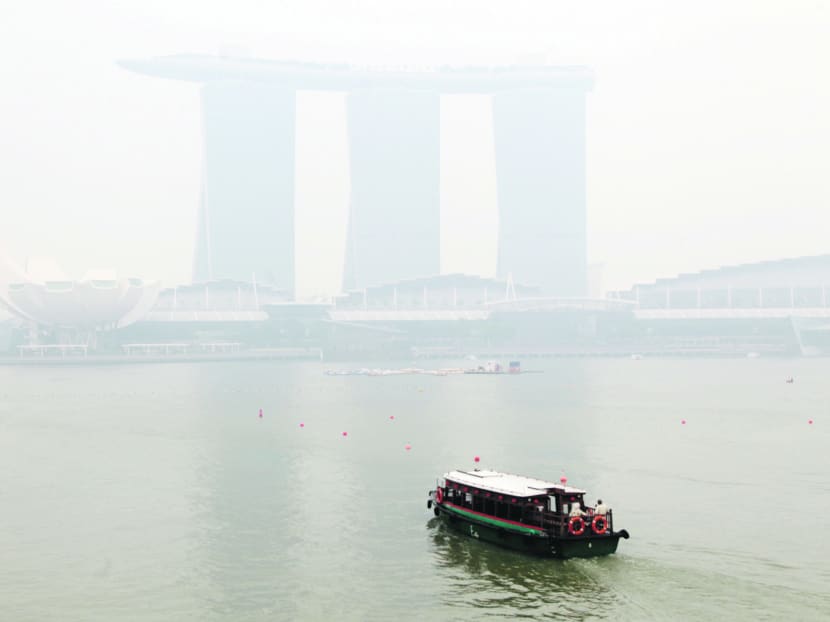Indonesia finally ratifies 2002 haze pact
SINGAPORE — Twelve years after signing the regional haze pact, Indonesia’s Parliament gave its unanimous approval yesterday to ratify the pact, offering a glimmer of hope that more would be done to ensure fewer haze episodes for Singapore and other neighbouring countries.

Singapore experienced its worst bout of haze in June last year, when the Pollutant Standards Index (PSI) level skyrocketed to an unprecedented 401. TODAY FILE PHOTO
SINGAPORE — Twelve years after signing the regional haze pact, Indonesia’s Parliament gave its unanimous approval yesterday to ratify the pact, offering a glimmer of hope that more would be done to ensure fewer haze episodes for Singapore and other neighbouring countries.
In doing so, Indonesia became the last of the 10 countries to ratify the 2002 ASEAN Agreement on Transboundary Haze Pollution. Signing an international treaty only expresses an intention to comply and a treaty becomes binding only when a country ratifies it.
Experts TODAY spoke to felt the move reflected Indonesia’s readiness to address the issue, but considerable challenges remain. Policies and enforcement efforts could be hindered by the layers of bureaucracy in the Indonesian government and further complicated by conflict between local communities and plantation owners, for instance.
Indonesia’s delay in ratifying the haze pact became a sticking point when Singapore experienced its worst bout of haze in June last year, when Pollutant Standards Index levels skyrocketed to an unprecedented 401.
Various Singaporean ministers have also spoken out against Indonesia’s non-ratification. At a foreign ministers’ meeting in Myanmar in May, Foreign Minister K Shanmugamcalled on Indonesia to ratify the pact, citing concerns that a possible El Nino phenomenon predicted for the year could exacerbate any haze situation.
Last month, Singapore passed laws on transboundary haze pollution that allow entities causing or contributing to unhealthy levels of haze here to be fined up to S$2 million.
Under the ASEAN haze pact, member nations are required to cooperate in developing and implementing measures that prevent, monitor and mitigate transboundary haze pollution. This includes controlling sources of land and forest fires, developing monitoring systems and exchanging information, among other things. They are also to respond promptly to requests for relevant information sought by other countries that are or may be affected by transboundary haze pollution.
Welcoming the Indonesian Parliament’s decision to ratify the pact yesterday, Singapore’s Ministry of the Environment and Water Resources noted the “urgent need” for effective action at the source, including deterrence, investigation and enforcement against errant companies responsible for the haze. Speaking to TODAY, Singapore Institute of International Affairs deputy director and fellow for ASEAN business and sustainability Chua Chin Wei said Indonesia’s layers of bureaucracy as well as the impending change in government made it hard to say if impact from the ratification would be felt.
“As far as we know, the budget for 2015 has already been fixed by the current administration. So even if (it) wants to implement new programmes or new initiatives, it will probably have to wait until 2016 where the new administration has the full ability to divert resources to address these issues,” he said.
National University of Singapore law professor Alan Tan Khee-Jin felt the move signalled Indonesia’s readiness to acknowledge the scale of the problem and the damage caused, but pointed out that agreement emphasises cooperation and there is no provision for compulsory dispute settlement.
“Fundamentally, the agreement cannot resolve the core causes of the fires and haze — these include poor law enforcement, corruption, and weak central control over local players,” he said. He also noted the complex land use issues on the ground. For example, uncertainties lead to local communities being pushed out of their lands by plantation owners, leading to cases of fires being deliberately set in retaliation. Such issues, he said, require long-term resolution.
Singapore Environment Council chief executive officer Jose Raymond noted that the ratification will allow more sharing of information between ASEAN members in the areas of policy development and haze mitigation measures, among other fields. It will complement the progress made on the Haze Monitoring System — which uses hot-spot data and satellite images to pinpoint illegal burning activities — that was approved by ASEAN leaders in October last year, he said.
A main stumbling block with the system had been the sharing of concession maps by the Indonesia and Malaysia governments due to legal constraints. Mr Chua said the pact provides for protocols for collaboration. “There could be a slight increase in the inclination to cooperate in terms of submission of the concession maps into the haze monitoring system.”






